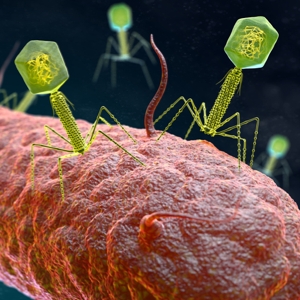Bacteriophage Therapy to Treat Acne Caused By Specific Strains of BacteriaPosted by Vivian creative on July 13th, 2022  The microbiome of humans consists of different microorganisms that both live inside and outside the body, in which the skin, the oral mucosa, and the gastrointestinal tracts are the most common habitat for the complex microbial community. Each individual has different microbiome composition and forms a symbiotic association with them. Take the skin microbiome as an example, it's made up of diverse organisms such as different strains of bacteria, viruses, and fungi, and usually, they live in a state of balance. But when alterations occur, the skin microbiome may lead to some skin diseases, such as acne vulgaris. Acne vulgaris is one of the most common inflammatory skin conditions, which is related to a gram-positive bacterium, Cutibacterium acnes (C. acnes). C. acnes is the most abundant skin commensal of the human skin microbiome and has different strains, some of which predominate in healthy skin and others are associated with acne. Healthy skin means different microorganisms live in a balance, while acne indicates a change in the abundance of certain strains and an imbalance. However, using antibiotics to treat acne is not the best choice, in that antibiotic treatments would not only kill specific strains of C. acnes causing acne but also other bacteria in the skin microbiome, thus leading to another dysbiosis. Therefore, the Translational Synthetic Biology research group at Universitat Pompeu Fabra presents a new approach to killing specific strains of a bacterium related to acne without affecting the balance of the skin microbiome. Bacteriophage therapy to manipulate the skin microbiome
The new strategy to eliminate acne-specific strains of bacteria is based on the finding of the viruses in the skin microbiome—bacteriophages, or simply called phages. Phages within the skin microbiome can regulate the microbial composition by infecting either narrow strains of bacteria or broadly within a population, which is known as phage therapy. Researchers have found that C. acnes has multiple temperate and lytic phages that can switch between different infection modes and significantly affect the microbial community. The lytic cycle of phages can kill and solubilize host bacteria, whereas the lysogenic cycle can impact host cells more subtly, both physiologically and genetically. Researchers pointed out that, though C. acnes phages have more than 85% overall sequence identity, they have diverse ability to infect certain strains of bacteria. PAD20 is one of the well-studied C. acnes bacteriophages, which wasn't strictly identified as a lytic or lysogenic phage due to the absence of stable lysogens and the absence of genes related to integration. Therefore, researchers studied the potential of PAD20 in killing various C. acnes strains and linked the increase of its specificity to phage DNA methylation acquired through infection of a methylation competent strain. Studies have shown that some strains of C. acnes in the skin microbiome can introduce modifications to their own genome and differentiate their own from non-own to prevent infection by bacteriophages. A conclusion has been drawn that bacteria without the ability to modify their own DNA were infected strongly by the bacteriophage while the modified bacteria were immune to the infection. To eliminate these specific strains related to acne identified, scientists proposed a mechanism of selectively killing a certain sub-population of strains by making the therapeutic phages target only strains that can't modify their own DNA. It turns out that bacteriophage therapy can modulate the composition of C. acnes strains over time. As a result, the acne-prone strains are reduced while strains with beneficial traits can be saved. In conclusion, this study reveals the potential to shape and engineer the infectivity range of C. acnes phages for the development of phage therapy. Moreover, it proves that epigenetic imprinting of phage DNA can change the susceptibility of phages on their host and can change specificity in infection, which opens the door for developing phage cocktails that could potentially modulate strain composition on human skin in further applications. Like it? Share it!More by this author |


